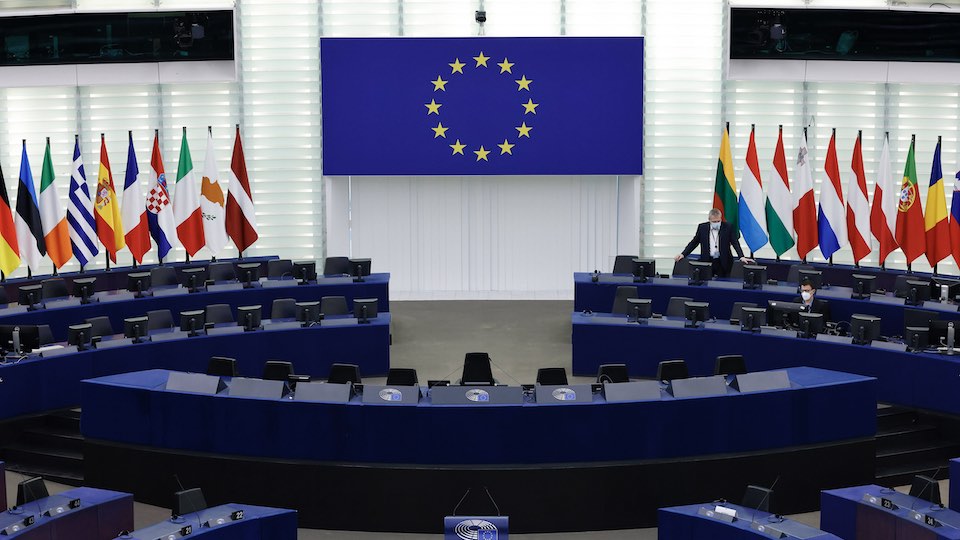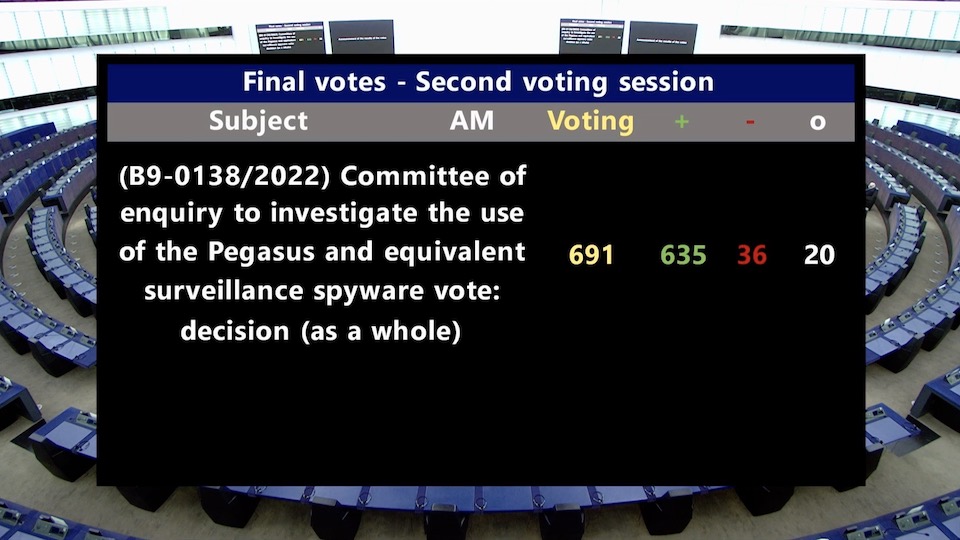EU Parliament investigates the use of Pegasus

The European Parliament will investigate the use of the Pegasus spyware within the EU. On Wednesday evening, MEPs voted by a large majority in favour of an investigative committee. The committee is now to investigate whether the spyware was used against journalists and politicians, for example.
Last week, the Conference of Presidents of the EU Parliament had already presented a proposal to set up a committee of inquiry (in German), which has now been adopted by Parliament. The Renew Europe group, among others, had previously called for an investigation.
The investigative committee is to consist of 38 members, who are expected to be appointed in a fortnight’ time. They are to present their final report in a year’s time. The committee will not only look into the use of Pegasus, but also into “similar surveillance and spying software”.
Committee will examine legal violations
The committee will examine whether EU member states have violated EU law – for example, the European Charter of Fundamental Rights or General Data Protection Regulation – by using spyware. It will also examine whether Pegasus was used for “political, economic or other unjustified purposes”, for example to spy on journalists, politicians, diplomats and civil-society actors.
The investigation will also look at whether the use of Pegasus has led to human rights violations or affected elections in the EU. It will also investigate whether the surveillance of smartphones with Pegasus or other spyware led to the leakage of personal data to governments of third countries and whether such data was transferred to the Pegasus manufacturer NSO.
The committee will also investigate whether the EU Commission had evidence of Pegasus being used against individuals and what role the government of Israel played in supplying surveillance software to member states. It will also investigate the legal basis on which member states acquired Pegasus.

Saskia Bricmont, Belgian member of parliament for the Greens, welcomed the establishment of the committee of inquiry on Thursday. She wrote that it was a “crucial step”. Violations of fundamental rights should not be tolerated.
The Renew Europe group called for those responsible for illegal surveillance of citizens to be held accountable.
Journalists and opposition members in the EU spied on
The reason for this are revelations by the organisations Forbidden Stories and Amnesty International, as well as several international media. Last summer, they uncovered how media workers, human rights activists and opposition activists were being monitored worldwide with the spyware Pegasus.
What is Pegasus?
Pegasus is a spy software from the Israeli company NSO Group. The spying software can completely take over an infiltrated device and, for example, turn on the camera and microphone without being noticed or copy all data. Location data can also be retrieved and passwords read out. The surveillance program has been criticized for years in connection with human rights violations.
Governments in the EU are also said to have used the spyware illegally. In Hungary, for example, journalists were spied on (in German). The chairman of the Hungarian Committee for Defence and Law Enforcement, Lajos Kosa, had confirmed the purchase of the spyware by the Hungarian Federal Ministry of the Interior last November.
At the end of December, security researchers at the Citizen Lab at the University of Toronto had also confirmed that in Poland, the mobile phones of a prosecutor critical of the government, an opposition lawyer and the Senate Deputy Krzysztof Brejza were monitored with Pegasus (in German). Brezja had led the opposition alliance’s campaign in 2019 as the ruling PiS party had won the election. Due to his phone being infiltrated with Pegasus over 30 times in 2019, Brezja suspects that internal details about the opposition’s campaign strategy were tapped and that the election had not been fair. An assistant to Brezja was also monitored.
In January, the leader of the Polish ruling party PiS, Jarosław Kaczyński, had admitted to buying Pegasus, however, he denied monitoring opposition members. In Poland, a commission of inquiry (in German) is currently investigating the incidents.
Evidence of abuse in other EU countries
In a press conference last week, Dutch MEP Sophie in ’t Veld of the Renew Europe group spoke out about the investigation plans. She said that not only the Polish and Hungarian governments had spied on their citizens. There are now indications that other EU countries have used Pegasus illegally. She cited Bulgaria as an example.
The establishment of parliamentary committees of inquiry at EU level is regulated in the Treaty on the Functioning of the European Union. Such a committee can request documents and summon witnesses. However, member states can refuse to cooperate on grounds of secrecy or public or national security.
In ’t Veld said that despite these limited possibilities, it is possible to bring wrongdoing to light. In a democracy, it is unacceptable for governments to monitor their citizens for political purposes, she said.
Data Protection Supervisor calls for ban
Following the revelations, the US had imposed sanctions on Pegasus manufacturer NSO in November. In early December, 81 organisations including Access Now, Amnesty International, Human Rights Watch and Reporters Without Borders, as well as independent experts, called on the EU to also impose sanctions on NSO.
Internationally, various human rights organisations are now calling for a moratorium on the sale and transfer of surveillance technologies.
In mid-February, the European Data Protection Supervisor, Wojciech Wiewiórowski, also called for a ban on spyware with the capabilities of Pegasus in the EU. Such programmes endanger people’s fundamental rights and freedoms, but also democracy and the rule of law. Their use was therefore incompatible with the democratic values of the EU. (js)